“If you have an underwater wine and it smells like sea, it smells good”
“If you have an underwater wine and it smells like sea, it smells good” https://underwaterwine.com/wp-content/uploads/2023/05/antonio_rectangular.png 1640 924 Crusoe Treasure https://secure.gravatar.com/avatar/a92b316a884d4396bd179329ef230451A few days ago we had a very special visit at Crusoe Treasure Winery: our Japanese importers came to meet us personally. They were days of much learning. One of the most remarkable moments was meeting our enologist Antonio T. Palacios and we want to share it.
Meeting our enologist
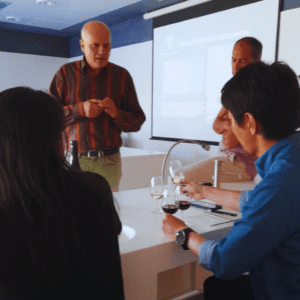
Speaking with Antonio is always a pleasure and a source of continuous learning, which is why we approached his analytical laboratory and even we accompany him in one of his sensory tasting classes at the University of La Rioja, where he made with his students a comparative wine tasting of a Duet of Sea Soul N7, our white underwater wine, and a Duet Sea Soul N8, one of our red underwater wines.
The response was surprising, knowing little about the process, everyone immediately noticed the differences and opted for the underwater sample.
“I was surprised because it is more enveloping, more complex on the palate”, Cristina, Antonio’s student, speaking about our Sea Soul N7.
Here we share part of Antonio’s explanation to his students, along with some of the questions that they made. We recommend you to read it:
Question: What does the sea contribute to wine?
Antonio: “The wines […] become softer, more velvety, polymerization increases. All this is obtained by making a wine according to a good disposition for underwater aging. You get a sensorial fusion between acidity, tannin, they are sweeter, more integrated wines.”
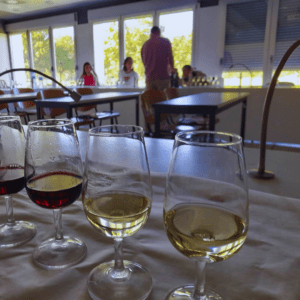 Question: What factors influence the evolution of wine under the sea?
Question: What factors influence the evolution of wine under the sea?
Antonio: “The waves, the currents, depending on the season… […] all the temperature changes, pressure changes, the currents, the kinetics itself, the movement of the water, all that energy makes the wine bottle go crazy. It is the antienology of stillness, of patience. To submerge we need brave, strong wines, with tannin, with acidity, wines that can withstand the onslaught of the sea, otherwise the sea destroys them.”
Question: Is the oxygen that underwater wine has the one that the cork has itself?
Antonio: “No, it isn’t. Underwater wines are born with more oxygen than terrestrial ones due to pressure. More oxygen enters the bottle than on earth, than at terrestrial atmospheric pressure. This is due to the pressure that the wine bottles are subjected to under the sea. In any case, we are talking about nano-oxygenation.”
Question: If oxygen gets in, could salt get in?
Antonio: “No, neither water enters nor salt. We do many types of analyzes to show that this does not happen, analyzes that we present to the health authorities.”
Question: What you get in 10 years in a land cellar, can we say that you get it in 2 years under the sea?
Antonio: “That mental relationship exists, but you are not going to go to the same place, you are not going to end up in the same profile. That is seen when tasting the wines. It is not just a matter of time but of a sensory journey. It is a different journey, it is an evolutionary journey that leads you to a more accelerated upbringing, but that is not why patience and time on land will take you to the same place.
Under the sea you have an energy that is transmitted through the bottle, plus a greater presence of oxygen, which makes the underwater wine breathe more, that, plus the temperature changes that make the volume change inside the bottle, go very good for chemical kinetics.”
Question: What cork is used?
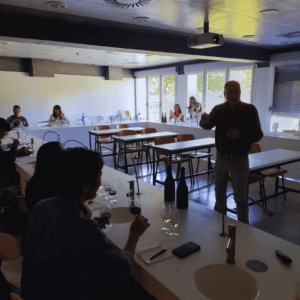 Antonio: “We use technical corks, made in such a way that they are very similar to each other, with an OTR, oxygen transfer through the cork, which is exactly the same from one cork to another, this is vital for underwater wine. The evolution of underwater wine is linked to the amount of oxygen and the kinetic changes driven by marine energy inside the bottle. This means that chemistry, especially due to polymerization phenomena and tannin-anthocyanin combination phenomena, goes much faster than on land. There is only one common factor with terrestrial aging: darkness.”
Antonio: “We use technical corks, made in such a way that they are very similar to each other, with an OTR, oxygen transfer through the cork, which is exactly the same from one cork to another, this is vital for underwater wine. The evolution of underwater wine is linked to the amount of oxygen and the kinetic changes driven by marine energy inside the bottle. This means that chemistry, especially due to polymerization phenomena and tannin-anthocyanin combination phenomena, goes much faster than on land. There is only one common factor with terrestrial aging: darkness.”
Question: What is underwater wine ageing?
Antonio: “The subtle temperature changes, we are talking about very few tenths, from one season to another, from summer to winter they can be greater, but really, the changes are very small, plus the pressure changes that are wave by wave; The waves can be from 1m high to 9m, all this makes marine kinetics modify the oxygen transfer and also modify chemical kinetics. All this causes the wine to change, to evolve positively if the wine is clean, stable and free of microorganisms.
The sea multiplies several times by “X” the wine that you submerge. If you submerge a bad wine, you will get a worse wine, but if you make a good wine designed to be submerged, you will extract a wine that the sea and the land will benefit.”
Question: Can we start with the tasting of the underwater wine?
Antonio: “In the case of white wine at the olfactory level, there is a part where the sea is felt. I don’t know if it’s subjective, it could be, but I smell a bit of sea breeze, aromas that lead you to mineralization in the olfactory profile. […] The olfactory background of the sea breeze makes it very elegant, makes it very appetizing. If you have an underwater wine and it smells like sea, it smells good. But taste yourself and see the difference.”
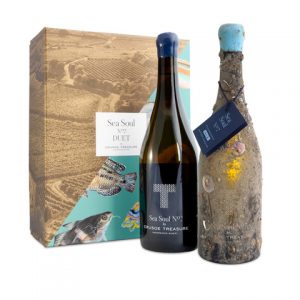
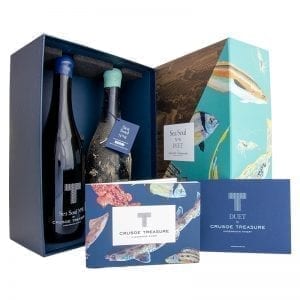 These are some of the highlights of this masterclass from our enologist.
These are some of the highlights of this masterclass from our enologist.
Taste yourself the difference
Discover our packs: Duet Sea Soul N7 and Duet Sea Soul N8.








